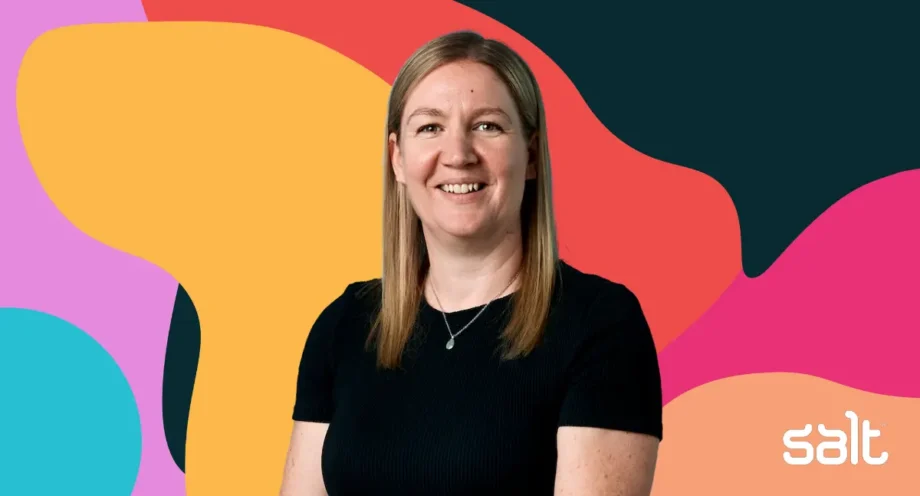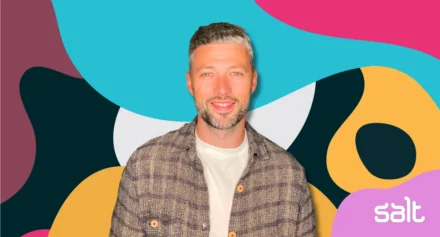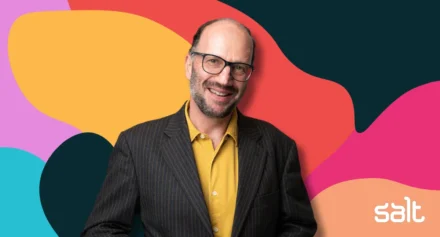Women in Tech: Fiona Hawkins on saying yes, leaning in, and Lego
Fiona Hawkins, Head of Delivery at Flux Federation, discusses the power of saying yes, the importance of building teams that lift each other up, and how Lego inspires her approach to problem-solving.

Salt’s Women in Tech interview series features conversations with thought leaders from around the world to gather their opinions and advice on how they have grown their careers in tech and overcome challenges and adversity during their careers. For our latest Women in Tech feature, Salt Founder and APAC CEO Jacqui Barratt spoke to Fiona Hawkins.
Fiona, can you tell us about your career journey?
I always start with the fact that I fell into what I do, but that’s quite common for a lot of people!
I moved to New Zealand many years ago and needed a job, so I started working in a contact centre for an internet service provider. That’s how I fell into technology – effectively back in the days of dial-up. The company grew, and I had the opportunity to grow with it, becoming a team leader. Then, I was shoulder-tapped to join the project management office, and I thought, “Sure, why not? What can go wrong?” I did some really cool work, like being involved in the unbundling of the fibre network in New Zealand – a massive undertaking – and building New Zealand’s connectivity. Of course, there were some challenges, but I don’t think I realised how cool it was when I was in the middle of it!
When the company I was working for was acquired, I moved into a different role, which was when I fell into consulting and earned my stripes as a project manager. I worked on a lot of technology projects – mainly focused on Microsoft CRM and SharePoint – and as a consultant, you really have to pull your socks up and be at the top of your game because you’re working in other people’s environments. But the experience and knowledge you gain across a variety of industries – I worked across everything from the building to the wine industry – is fantastic and can’t be replicated anywhere else.
You also work with a whole raft of people – from the C-Suite to those who use the tools, platforms, and technology daily. Alongside that, you work with experts who know the technologies inside and out, which I really love. As a project manager, you may be accountable and responsible for the successful delivery of the project, but it doesn’t mean you know how to configure or design the best approach or delivery for the platform, tool, or piece of technology you’re working on. It’s cool to draw on other people’s knowledge and experience, and learn from them as well.
After this role, I decided I’d like to return to a client-side position, and I stumbled into the energy industry, which is quite a small industry in New Zealand, and even smaller in the project management space. The conversations are still the same [as any other industry]; we need to support our customers, we need to be able to move quickly, we need to make cool products – and it’s all enabled through the underlying technology platform. And, on the client side, because technology is constantly changing, there’s a focus on risk: how much will this cost us? Is it compliant? Does it meet regulations? Is there the potential for any fallout? So, you learn more about the pros and cons, but the thing that sits really well with me is that you usually run a project from end to end, which, when you’re consulting, you don’t always get to do.
Then, one day out of the blue, I had a call from someone I’d previously worked with, and they said, “We’ve got a senior PM role, do you want to come back and work with us?” Again, I thought: “What have I got to lose? Let’s give it a go!” So, I returned to telecommunications, though the company itself is broader than telecommunications – they cover cybersecurity and critical communications, amongst other things. So, I learned about business continuity, failover plans, and how to keep systems secure. Cybersecurity has grown in importance over the last 15 years, and it has obviously bled into our daily lives, with warnings against phishing scams, clicking on unknown links, and giving out credit card details, among other things. I always enjoy speaking to the cybersecurity team about what’s new!
I had the opportunity to put my hand up to lead a team, which was a goal I’d been chasing at the time. I enjoy the PM space, but I wanted to step up and successfully lead a team. I was leading a team of four or five PMs, and it was a massive learning curve for me, but with an amazing team around me. Relatively quickly after that, I had the opportunity to step into the head of customer delivery role, leading a team of about 44 people – quite a step up from senior project manager. At any one time, the team would have over 100 projects underway, working with all levels of the organisation and lots a lot of customers, and were responsible for delivering business-critical projects.
The team was awesome – incredibly dedicated. If team members were sick or needed time-out for whatever reason, the rest of the team would come together and make it happen. It was a great group of people to lead, and I also had the opportunity to lean into the commercial side of the business, championing business optimisation initiatives powered by new technologies to solve significant organisational problems.
Since then, I have relocated from Auckland to the Bay of Plenty and returned to the energy industry and delivery space.
What is the most exciting part of your work as Head of Delivery at Flux Federation?
I enjoy the delivery space – there’s always something different or a challenge popping up somewhere.
The most exciting part of my role has been building an amazing team around me and seeing them step up and come into their own. There is nothing better than seeing members of your team reach their full potential and then outshine you. That sounds a bit crazy, but I’m thinking, “You don’t need me anymore! Go. Go. Do the amazing things!”
I’ve come up in my career at this weird time where there’s been a big mindset shift around gender balance – not just closing the gender pay gap but also ensuring we have diversity in the workplace. It’s been amazing to watch it unfold and try to help break down some of the barriers, too. I work remotely now, but I remember – earlier in my career – walking into the office knowing I was walking into a meeting full of men, and making sure I had heels on, so I was just two inches taller, and closer in height to my colleagues.
What should we be doing to encourage girls and women to consider a career in technology?
Fiona:
This topic comes up a lot! You can dream what you can see, so we need to role model the fact that anyone can work in these [traditionally male-dominated] industries. We need to ensure girls and women know these options are available to them – and a tech career is one of these options.
Words that get thrown around a lot are ‘tech’ and ‘technology’, but technology takes a lot of different shapes, forms, and descriptions – so lean into and explore these opportunities when you get them!
Jacqui:
You’re right that there are so many tech-related roles, and one of the reasons we started this Women in Tech series is that when people say ‘technology’, one of the first roles that comes to mind is a developer in a cave, and they don’t see the different roles. But you’ve had an exciting tech career journey – you’ve taken shots at different things and moved in different directions.
Fiona:
And, as I said earlier, there is a greater [gender] balance. Just this morning, in our team stand-up, I took a moment to appreciate that my leader’s three direct reports are all women, which is cool. It’s really nice to see this shift and to show the generations behind us that you can do whatever you want to do, even if it means wearing heels so you’re a little bit taller when you walk into the room!
In your opinion, what is the biggest obstacle to women’s career progression?
Fiona:
We don’t apply for jobs unless we tick all the boxes. We don’t champion ourselves for a variety of different reasons, but what’s the worst that could happen? It’s always going to be a ‘no’ unless you ask. I think women tend to think, ‘I wouldn’t be very good at that’, ‘Oh, it’s probably not for me’, or ‘Somebody else could do it better’ when you’re probably the perfect fit, but you may have a small gap which is totally learnable.
Jacqui:
It’s a balancing act. We want society to champion us and be allies because we need support, but equally, we need to put ourselves in the ring or in contention.
We often say in recruitment that women don’t apply for a role unless they meet 80% – 90% of the criteria, while men will apply if they meet 50%. This insight doesn’t mean that men are worse than women or vice versa, but it does tell you a lot about people’s behaviours and beliefs. As women, we need to think, ‘I can do most of this and I can learn the other bits. I might not get every role, but if – as you said – I don’t lean into it, I don’t know.’
How have the best allies throughout your career supported you?
You definitely need supporters and allies; I will always remember Scott Bartlett, who, unfortunately, is no longer with us, but with whom I worked very closely. He was the one who phoned me about this opportunity; he was very much an ally and champion of helping people step up, move forward, and achieve their goals.
My current leader is definitely an ally; he, too, champions and supports his team all the way.
You need to find these people throughout your career – sometimes you work alongside them, sometimes they are your coach, sometimes you meet them through friends, and sometimes you have to seek them out. Finding allies is about figuring out the right time to reach out to the right people. It can be quite difficult, but if somebody’s offering you help, take it.
Do you have an active mentor? How valuable has mentorship been to you?
Yes, and extremely valuable! I used to work with an amazing coach in Auckland, and what I have found with a good coach is that they don’t tell you the answers, which always frustrated me. They make you lean into your own skill set and knowledge – but haven’t discovered or decided you’re brave enough to use it yet.
When I had the opportunity to move into leadership roles, I knew I needed someone to help me. It’s a big step from being part of a team to leading one, and I wanted to ensure that I had the necessary knowledge and support to be successful. I chose an external coach, but I also believe in coaches and mentors within a business. There’s a lot of value to be gained by sharing knowledge gained through coaching and mentoring internally.
You have had a varied career journey: What can individuals and organisations do to develop capabilities for and encourage non-conventional career paths?
Fiona:
I wouldn’t be in the role I am today if I hadn’t been given the chance to be – so it’s all about somebody giving you the opportunity or you giving somebody else the opportunity. You may have an open position you’re looking to fill internally, and you really want someone with eight years of experience. But, if you have someone with two years of experience and cool ideas and initiatives to bring to the table, lean in, let that individual step up, and see how they get on!
Don’t look at the education behind the person; look at how they perform, how they show up every day, how they come to the party. This is something I really struggled against – as I now proudly display my degree on the wall behind me!
I didn’t go to university until I was in my 30s; I left school and entered the workforce at 16. But I ended up going to university because I was tired of the fact that everyone overlooked my years of experience in the workforce and all the business knowledge I could draw on because I didn’t have any tertiary qualifications. I think we need to be prepared to take a gamble – we need to look at people whose pathways don’t reflect ours, or a ‘traditional’ career pathway, and consider how awesome they could be if somebody just gave them an opportunity.
Jacqui:
It sounds like a lot of people come to you with opportunities – and you say, “Yes!” You don’t shy away from opportunities – you have the belief and confidence in yourself to think, ‘What have I got to lose? I’m going to say yes to this, and what’s the worst thing that could happen if it doesn’t work out? I’ll take another path!’ That’s the combination: finding a champion or someone to give you an opportunity, then saying yes and backing yourself, not being afraid to put yourself out there.
Fiona:
100%. And, as you start to lead teams, you notice that you don’t have to be the smartest person in the room. That’s not your role; your role is to open doors so the smartest person in the room can help you walk through them. Once you’re a leader, your job is to make sure your team can be successful.
What can we do to promote and nurture women’s careers?
I’m passionate about opening doors and providing opportunities in spaces that may not be in individuals’ job descriptions or within their current remit – I’m doing a lot of that at the moment. The key for me is to understand the short- and long-term learning and development goals for all my direct reports and wider team members, because it’s amazing how often someone says, ‘Oh, if only we had somebody who wants to grow their BA skills’, or ‘somebody who wants to work with AI’, or ‘somebody good with data’. When those conversations happen, I can say, ‘Well, that’s not me, but I have three people on my team who are interested.’
I’m also open to external training. You can’t do everything in-house, so what does external support look like, and how can we help team members move forward utilising external training and support?
If team members are keen and interested, then opening the door and helping to move them in a different direction is key for me.
Who is your modern-day hero?
Jacinda Ardern is someone who pops to mind instantly. She’s a similar age to me and was on a very public stage. I would look at her and think, “I can barely run my life, and you’re running the country!” I enjoyed watching her grow and lead the country through what was, let’s be honest, an incredibly unusual and challenging time with compassion. Did she do it perfectly? No. Would anyone have done it perfectly? No. But I think she made the best of a rubbish situation.
Sheryl Sandberg is another inspirational woman; Lean In: Women, Work, and the Will to Lead was a rallying cry to women: ‘Come on. We’ve got this. We can do this. Let’s show the world that we can do these roles.’
I don’t have a singular modern-day hero, but I do enjoy watching successful women succeed and pay it forward. That’s always nice!
Do you have any media recommendations for staying updated?
I gain a lot of business knowledge throughout the day, consuming various pieces of information depending on the project or task I’m focusing on.
I also listen to podcasts for pleasure, as well as use them as an opportunity to top up my professional knowledge. But I have to be in the right frame of mind to listen to something I can learn from. Otherwise, it just goes straight in one ear and out the other!
Recently, I have been listening to a lot of great women in tech podcasts, Spotify has a whole host of these so hop on and find something that resonates with you.
What is your biggest stress reliever?
Fiona:
I’m a walker! I have a walking pad under my sit-to-stand desk, which is really good, but there’s nothing better than getting outside and having a meeting while I’m walking! There’s also a local Pilates studio nearby, which is nice, because working from home can be quite isolating, and sometimes I miss connecting with other people. The studio has a community feel, and I can get some exercise while talking to other people who are struggling through the Pilates class with me – movement for stress relief and catching up with people in real life is the best thing!
Jacqui:
I had a walking meeting with a team member the other day – I said to her, “I haven’t been out of the office since I arrived at work, so let’s just go out and do 15 minutes.” We ended up doing a loop around Singapore, and our meeting was a lot more productive because we got some fresh air and stimulated our brains. We both came back with clear heads, feeling so much more invigorated!
Fiona:
There’s a lot of research about the benefits of endorphin release and how we engage better – among other things – when we move.
What is one piece of advice you wish somebody had given you at the beginning of your career?
Never walk away from opportunities; I wish someone would have told me to champion myself because, honestly, no one else is going to do it!
What job did you dream of doing when you were a kid? What was your ‘Plan A’ career path?
Fiona:
I was never someone who left school thinking, ‘I’m going to be a doctor, or a lawyer, or a vet.’ There was never one thing I thought I would do – maybe I’m still trying to find it – but I don’t think it was what I am doing! I have fallen into the project rescue space; I enjoy bringing all the pieces of the puzzle together and love nothing better than the challenge of solving big, chunky problems. Over the years, I have been brought onto projects that weren’t succeeding and have been able to fix them and get them going again.
But the short answer is that when I was younger, would I say this is what I’d be doing? No!
Jacqui:
You almost wonder, was a role like yours even in existence then? Your role has been partially created due to our use of technology, which has changed the way we do things, and in turn, has created problems to be solved.
Fiona:
The role I’m doing now probably didn’t exist, but there are growing opportunities in this space, while we’re also seeing roles disappear due to AI – moving forward and seeing what happens next will be interesting.
Jacqui:
What are your views on how AI will impact project management and delivery?
Fiona:
I hope it will make life easier, but when it comes to project management, the people piece of the puzzle is the critical piece that can make or break a successful project. And, at the moment, AI can’t replicate this people piece – communication, the ability to take people ‘on the journey’ with you – so hopefully it will alleviate some of the manual administrative tasks.
Jacqui:
There is also the ethical or moral dilemma of whether we want AI to replace the human element. We have huge numbers of people with mental health or loneliness issues [due to the amount of time we’re already spending online], so what does it mean to people to have even less human connection?
There are also countless posts on LinkedIn, for example, saying that we’ll only be working two days a week [due to the introduction of AI] – but will we really? What will that look like for organisations? Let’s not kid ourselves that organisations will suddenly say to their employees, ‘I will continue to pay your full salary, and you can work two days a week’.
We need to critically assess what we want to use AI for and what we don’t – and we need to feel empowered to say, ‘No, that’s not part of the world we want to operate in.’
What is a fun fact about you?
Fiona:
This is a funny question, because it came up with my team this week! I used to work at LEGOLAND UK. I spent three years of my life working there, and I am a big fan of LEGO – but, let’s be honest, who doesn’t love LEGO?
There’s such a cool story behind the LEGO brand; it was originally wooden bricks but reinvented itself and put itself at the forefront of children’s toys. If you haven’t, I recommend that you Google the meaning of ‘LEGO’ because it’s fascinating. In Danish, it means ‘play well,’ and in Latin, it is slightly different words but basically means ‘I assemble.’
Jacqui:
I was fortunate enough to visit LEGO’s offices here in Singapore a few years ago – every table had a fishbowl of LEGO on it, and you naturally start playing with it. It’s something that’s remained throughout generations, and working at LEGOLAND would have been loads of fun!
Fiona:
It was a real experience, and it taught me a lot of the business lessons I still draw on today.
Jacqui:
I’ve recently read a book called The Year of Living Danishly, written by Helen Russell, former editor of marieclaire.co.uk. She’s British, and her husband came home from work one day and told her that he’d landed his dream job at LEGO in Denmark. So, they shifted to Denmark and had an amazing life.
Ever since I read the book, I’ve just been so fascinated by the grounded Danish way of life and the Danes’ outlook on life. When my husband and I visited Copenhagen, we were walking down a street when I passed a rubbish bin and heard a noise. After thinking, “What on Earth is that?” I realised that they have an underground system that sucks rubbish out of the bins, then takes it back to a plant to transform it into energy. There’s no need for big rubbish trucks on the road – it’s so clever. As a recruitment professional, their approach to employment, ensuring people have meaningful work, and creating an aptitude for learning by providing an environment where anyone can learn for free at any age, is also admirable.
Fiona:
In countries like Denmark, every generation buys in – they’re all on board and moving towards the same goal. I don’t know if there’s another way to describe it, but it feels calm. And the ice cream is amazing!


